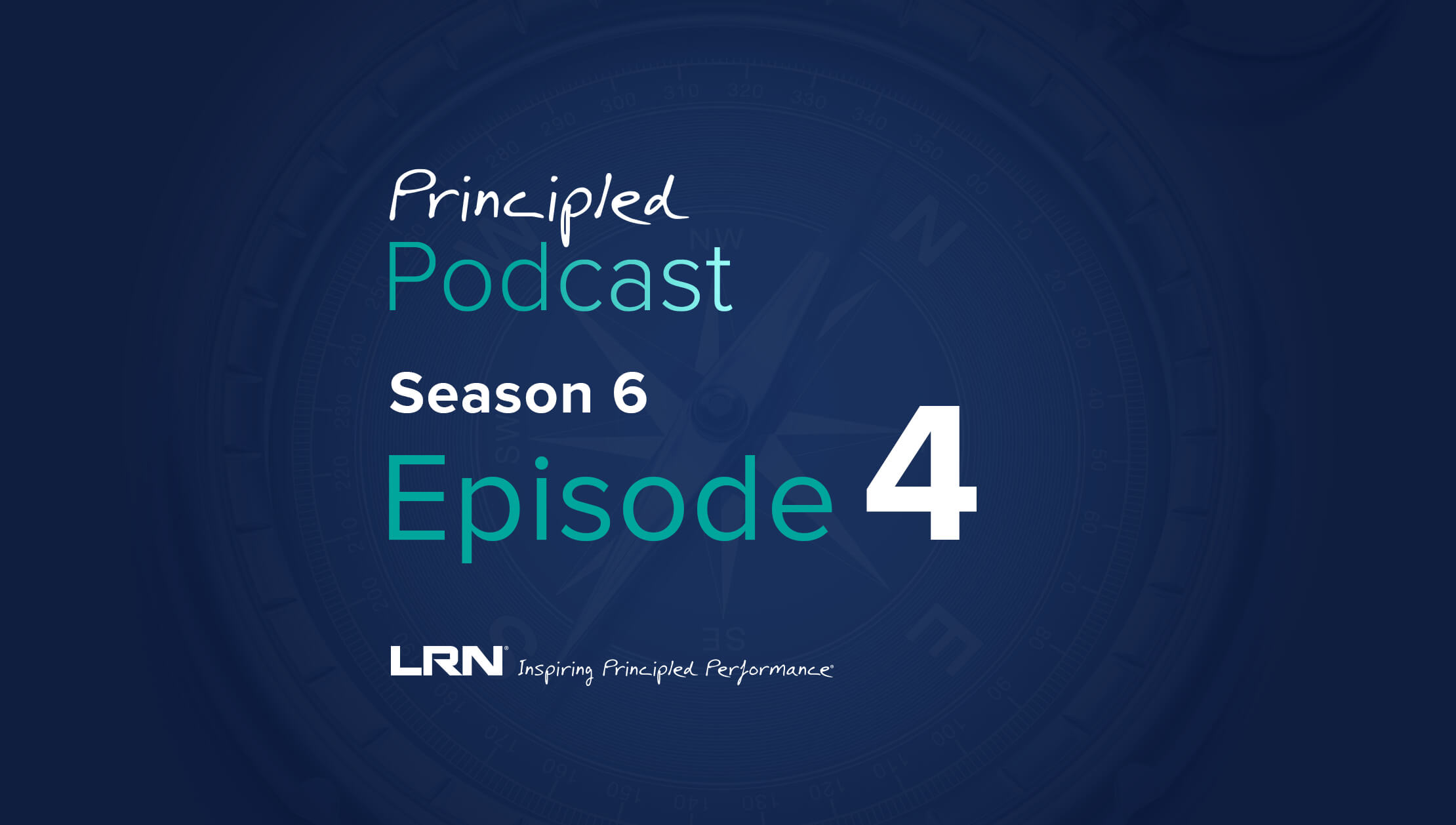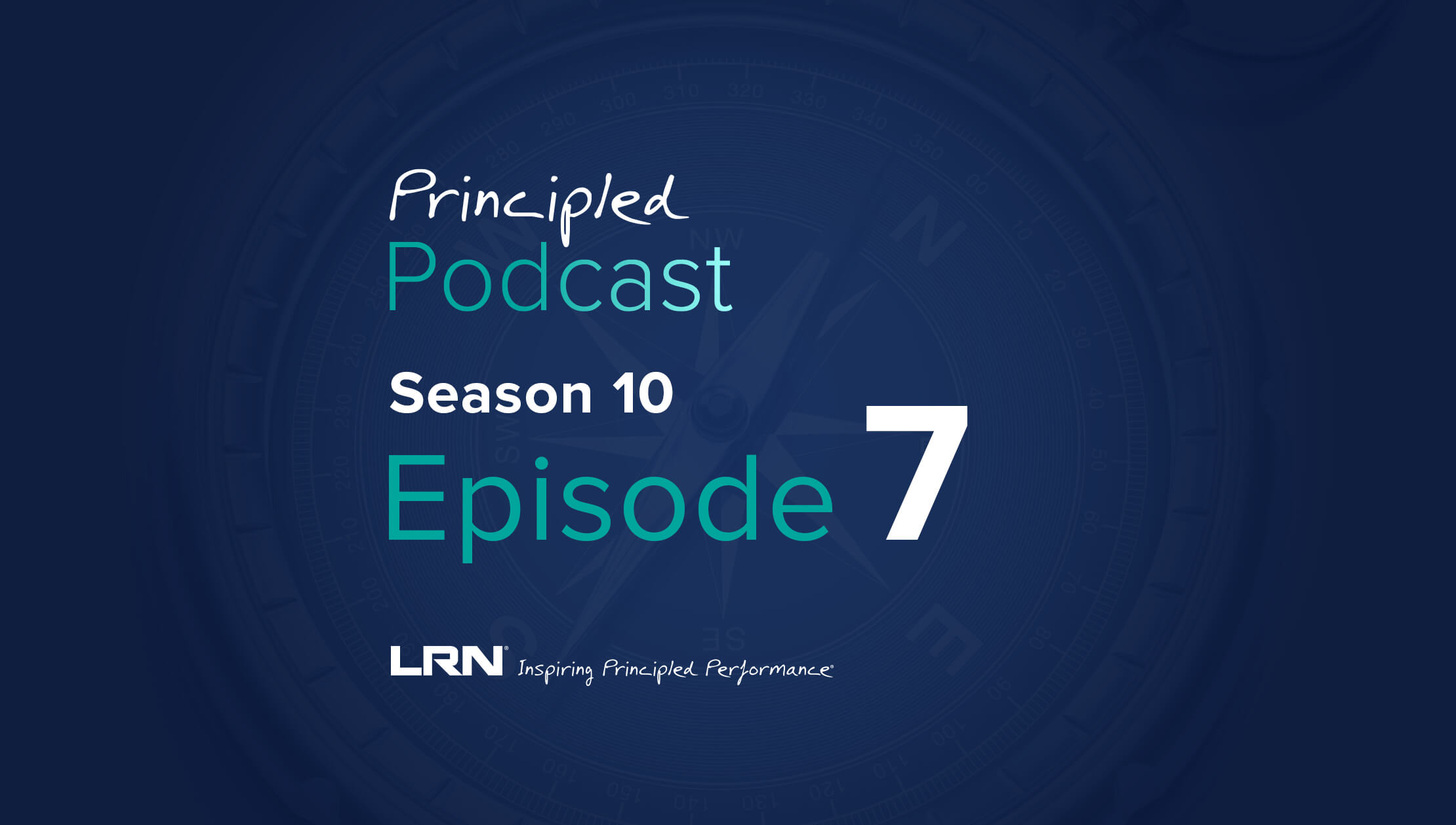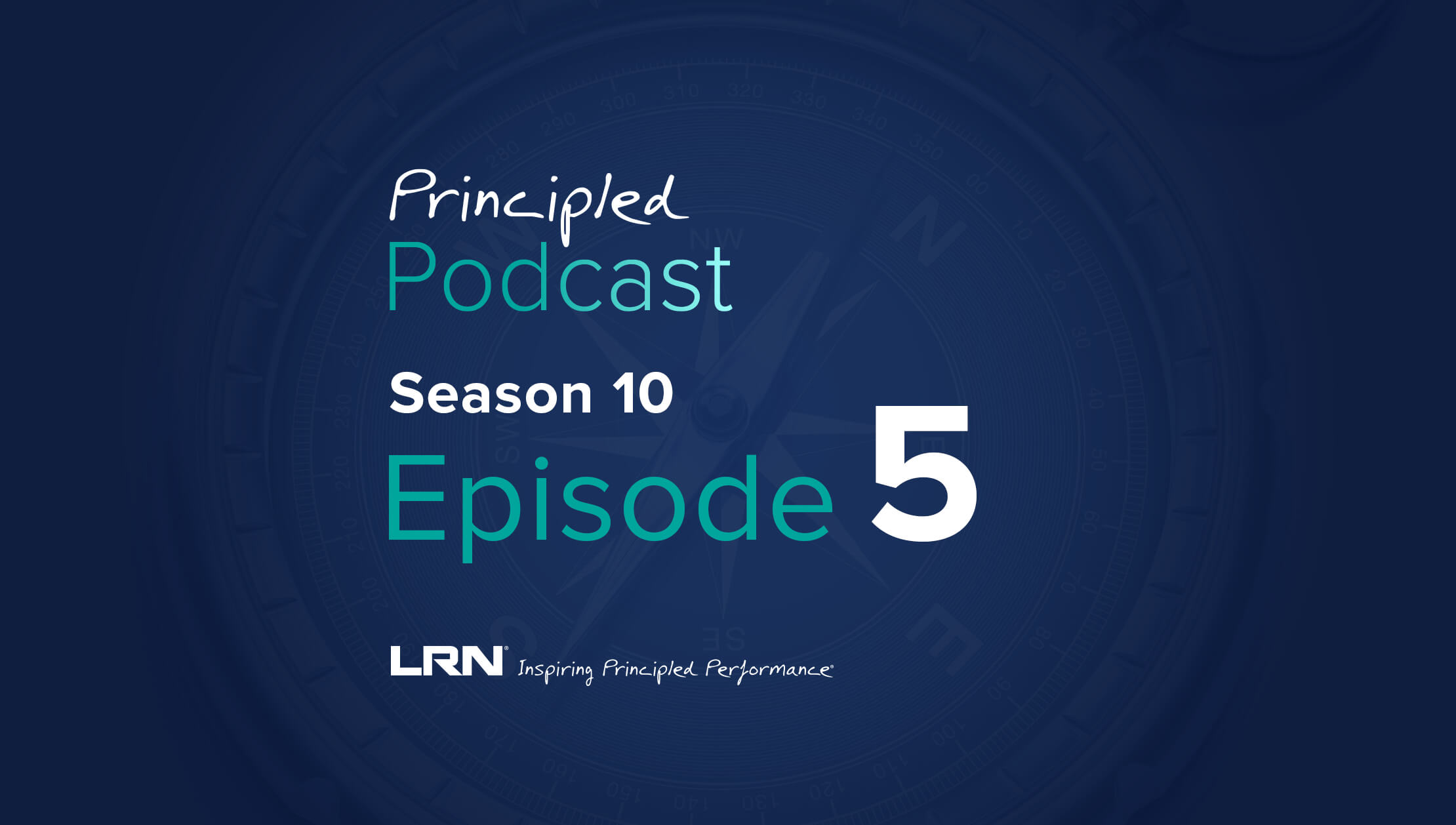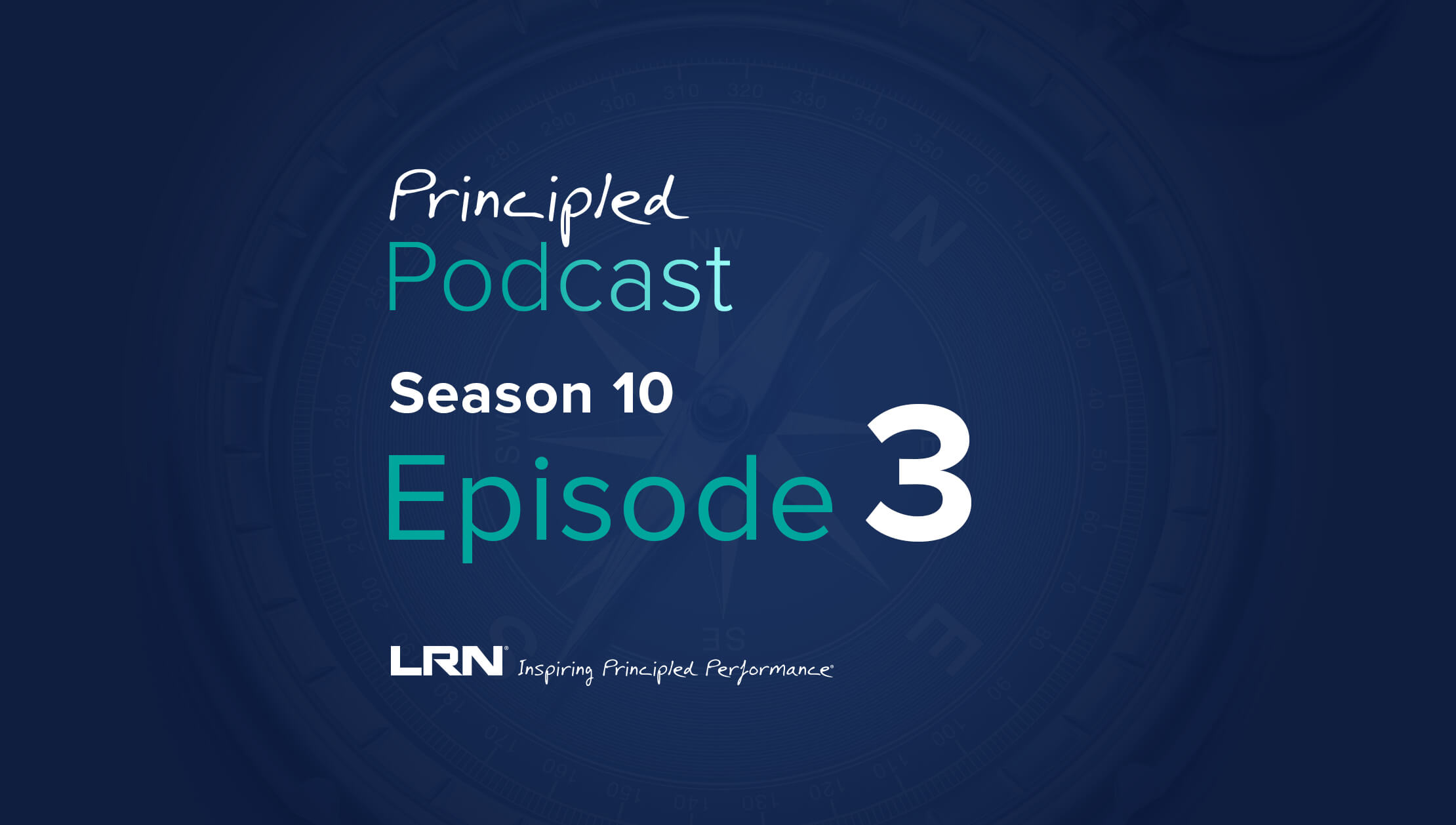What you'll learn on this podcast episode
As our world continues to witness converging crises of health, economic stability, climate change, and inequality/injustice, ESG seems to be having a moment. However, forward-thinking organizations understand that ESG—and its business expectations—represents a movement. In this episode of the Principled Podcast, LRN Senior Advisor Emily Miner talks with Che Sidanius, Global Head of Financial Crime & Industry Affairs at Refinitiv, about environmental, social, and governance initiatives—also known as ESG—and where organizations currently stand when it comes to ESG commitments, activities, analysis, and measurement. Listen in as Emily and Che explore how different parts of the world execute on ESG, what factors are at play when implementing ESG strategies, and how “green crime” threatens the environment, business, and security.
Principled Podcast shownotes
-
[3:57] How has Covid accelerated the focus on ESG?
-
[5:58] What are the three pillars of ESG and how are they connected?
-
[8:30] How is ESG being addressed?
-
[10:15] Is there a spectrum in regards to where businesses stand on their prioritization of ESG?
-
[16:12] Who are the role models in Europe and the U.S. for their ESG prioritization?
-
[18:15] How will the new SEC Climate Task Force change the business landscape?
-
[23:20] What are Refinitiv’s strategies for addressing ESG?
-
[26:40] What is Che’s personal drive when it comes to ESG?
-
[28:56] What would Che tell a young child who wants to know how these systems of environmental damage can be repaired?
Where to stream
Be sure to subscribe to the Principled Podcast wherever you get your podcasts.
Guest: Che Sidanius
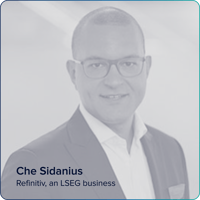
As the Global Head of Regulations & Industry Affairs at Refinitiv, Che Sidanius manages how regulatory changes around financial crime affect the company’s risk and supply chain business globally. His responsibilities include proposing courses of action to address regulatory changes and drive execution throughout the organization. Prior to joining Refinitiv, Che worked at Big 4 consultancies within Capital Markets Advisory. He also spent part of his career as a Senior Advisor at the Bank of England as well as a Senior Examiner at the Federal Reserve Bank of New York during the 2007-09 financial crisis.
Host: Emily Miner
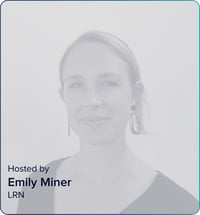
Emily Miner is a Senior Advisor in LRN’s Ethics & Compliance Advisory practice. She counsels executive leadership teams on how to actively shape and manage their ethical culture through deep quantitative and qualitative understanding and engagement. A skilled facilitator, Emily emphasizes co-creative, bottom-up, and data-driven approaches to foster ethical behavior and inform program strategy. Emily has led engagements with organizations in the healthcare, technology, manufacturing, energy, professional services, and education industries. Emily co-leads LRN’s ongoing flagship research on E&C program effectiveness and is a thought leader in the areas of organizational culture, leadership, and E&C program impact. Prior to joining LRN, Emily applied her behavioral science expertise in the environmental sustainability sector, working with non-profits and several New England municipalities; facilitated earth science research in academia; and contributed to drafting and advancing international climate policy goals. Emily has a Master of Public Administration in Environmental Science and Policy from Columbia University and graduated summa cum laude from the University of Florida with a degree in Anthropology.
Principled Podcast transcription
Intro: Welcome to The Principled Podcast, brought to you by LRN. The Principled Podcast brings together the collective wisdom on ethics, business and compliance, transformative stories of leadership and inspiring workplace culture. Listen in to discover valuable strategies from our community of business leaders and workplace change makers.
Emily Miner: As our world continues to witness converging crises of health, economic stability, climate change, and inequality and injustice, ESG seems to be having a moment. However, forward thinking organizations understand that ESG and its business expectations represent a movement. Hello, and welcome to another episode of LRN's Principled podcast. I'm your host, Emily Miner, senior ethics and compliance advisor. And today I'm joined by Che Sidanius, the global head of financial crime and industry affairs at Refinitiv, a London stock exchange group business. We're going to be talking about environmental, social, and governance initiatives, also known as ESG, and where organizations currently stand when it comes to ESG commitments, activities, analysis, and measurement. We'll also explore how different parts of the world execute on ESG, and what factors are at play when implementing ESG strategies. Che, thanks for coming on the Principled podcast. Can you start by introducing yourself to our listeners? Your title is global head of financial crime and industry affairs, which might not scream ESG to many of our listeners. What's the connection?
Che Sidanius: Absolutely. So first of all, thank you so much for the invitation, and thank you Emily for hosting this webcast. I'm delighted to be joined with you. So broadly, let me take a step back. In terms of my role with Refinitiv, we are a big believer that in order to tackle many of the issues that we face today, including sustainability and ESG as a measurement of trying to address the issues around allocating or shifting the allocation of capital to industries and sectors and companies, we're trying to do the right thing and at the same time, engage with policymakers, and helping them to understand what some of those challenges are, including data standards and data taxonomies, in order for us to achieve that goal.
Why am I here? What's the connection between the financial crime? It's, there's a convergence between the financial crime activities that we're seeing, particularly related to environmental crime and what we call green crime, which is the intersection between illicit proceeds of illegal logging, illegal wildlife trafficking, illegal fishing, and many of the other aspects that influence and impact our environment and sustainability and the ESG agenda.
So I work as a function of that. I work very closely with our sustainable finance team, with our ESG team, and in fact, to allow our ability to combine our data sets that we both have, to enable both companies and sectors and policymakers to make more informed decisions, and not just looking at environmental crime or sustainability agenda as purely as an act of trying to meet the Green Deal and many of the aspects of the green deal that any organizations [inaudible 00:03:32], but actually to look at it more holistically. So just as the sustainability team and the ESG team are doing more to look at our financial crime data, we at the same time are looking at ESG data in a different way that we haven't done in the past. And I think that this acceleration of both of those issues are only going to gain momentum in the future.
Emily Miner: Thank you Che. When we were talking earlier, you mentioned that COVID is also accelerating the focus on ESG. Why is that?
Che Sidanius: Absolutely. We launched a campaign about a year and a half ago... more than a year and a half ago, almost two years ago, on a theme that we called green crime, which is that we were actually seeing the increased activity and potential impact of environmental crime issues that it has on sustainability, as I mentioned with fishing, illegal logging, et cetera. And this is before COVID. When COVID happened, that was a game changer in terms of awareness that in fact, our interaction with the wildlife and interaction with the wet markets and the trading of wildlife had an actual incredible impact in terms of spreading potential diseases.
The awareness of the economic consequences, the social consequences, the consequences to the health of our families, has now reached a point where maybe two years ago this would've been, "Oh that's a very interesting idea, but I don't see how that's relevant," when we all know now that these things are not just about climate change that's the happened in the future, but in fact they have a real impact on peace and security right now. And so that really is why COVID has been a real game changer in terms of raising awareness on this issue.
Emily Miner: Yeah. When you put it like that, I'm thinking about all the interconnected elements, and it's really actually quite mind-boggling to think about how COVID, and health, and markets, and countries, and people, and goods and services, and movement, ideas, how the movement of all of those things kind of are putting us where we are today. So maybe with that kind of big, sometimes overwhelming picture in mind, can I ask you to break down ESG into the E,, the S and the G, and talk about where we are right now with respect to our understanding of what that is, and kind of current activities and measurements related to the three pillars?
Che Sidanius: Yeah, absolutely. So historically up until today, the major focus has been on the E, or the environmental piece. The European Commission, the US, and many of the jurisdictions are really focused quite a bit on what should be reported, what are the data taxonomies around that, and making sure that there's some kind of consistency in terms of what companies and organizations should be required to report. And there's of course a healthy debate about what should be voluntary versus what should be mandatory. The G however has received some attention, but the S has received very little attention. In fact, no one actually knows what the S actually means.
And I mention the S, because it is connected to the E. The labor rights, and the human rights, and diversity and inclusion are very much connected to the environmental consequences, so that we see that in many parts of the world, including the middle east, including the US, we're even talking today what's happened in Louisiana. They have consequences in terms of human movement, and also criminal actors taking advantage of that. So we tend to think of the E and the S and the G as though they're separate pieces, when they're in fact very much connected. And we know that from, again, from a financial crime perspective, that criminals are interconnected, they're global, they're very sophisticated. Companies are interconnected, they're global, and it's really about causing real focus into these issues.
So I think a lot of great work is done on the E. We still have some work to do on the G, but the S I think is another piece that's going to receive increased focus. And we, very quickly, I'll very quickly draw attention to a paper in fact, that that was launched and published a few months ago. That was the leadership that was Thomson Reuters Foundation, to look at the S. To actually say that, you know what, while there's more for us to do, there's enough data there for organizations and institutional investors to look at, and there's an incredible weight and much more work for us to kind of really push in terms of policy reforms, to make sure that the E as much as received attention, that the S, that receives equal amounts of attention as well.
Emily Miner: Yeah. Actually to that point that you were making around how the S, the social aspect is connected to the E, the environmental aspect, I just read yesterday that the US Federal Health Department is creating a new office to address climate change as part of their broader health equity agenda. So again, that connection between the environment and how that's impacting society and inequality and justice.
Che Sidanius: If I could Emily, on that, there's no question that regulators, policymakers are paying more attention to this now than ever. We know that the SEC, the Securities Exchange Commission, has made some very particular statements on this. The European Central Bank has made some very particular statements on this. And so the time for the industry at large to translate its language regarding what they say from a marketing perspective to actual action is the disconnect that we need to close.
And we of course as a company are committed to this, and we can talk about that, but there's no question that this is the way of the future. As I've said before, companies and industries can either, [inaudible 00:09:42], lead, follow, or get out of the way. But there's no question that as the title rightly makes the point, that the ESG is not a moment. It is a movement. We're going to see the greatest wealth transfer happen between one generation to another. Wide estimates in terms of what that transfer is, but it's somewhere around $30 trillion, and that is quite an astounding number. So I think it's an important piece for organizations to get on top of.
Emily Miner: Yeah, absolutely. And you just mentioned the need for these efforts to be more than just marketing initiatives, and I want to kind of focus on that for a little bit, because we also have the stakeholder capitalism movement that intersects with ESG in a lot of ways. And there's a debate playing out right now in the pages of the Wall Street Journal about whether any of this talk is actually translating into action. We're two years out from the Business Roundtable's new declaration of the purpose of a corporation, and some say this is all hot air, whereas others are citing meaningful progress, albeit slow. Where do you fall down on this debate? The spectrum from nothing's happening at all, to yes, things are changing? So where do you come down on this debate in general, but then also in particular in relation to ESG, our topic today?
Che Sidanius: No, it's a great question, and there is a spectrum. There's a spectrum in terms of organizations who are still driven by short-term profit-making versus a longer, more sustainable economic model. There's also debate about publicly traded versus privately held organizations, where the publicly traded organizations are still driven and still much pressured by the investor community to focus on short-term profit. And there's a wide spectrum, and I guess my point is the following. There's no clash between short-term profit and long-term profit. There is a clash however between short-term opportunism and more of a longer-term sustainable agenda. And this has to do as much with, if you look at the diversity of boards, that have been shown to be more stable, incomes and profits have been more stable over time. There's a connection between organizations who are committed to a more sustainable business practice and a more stable and profitable sort of trajectory in terms of where they go.
And yes you can make the argument, yes CEOs, they're being pressured by shareholders to continue to deliver [inaudible 00:12:26] profit incentives. But there also needs to be a recognition that there's a longer play here. There's a play with the brand, there's a play about doing the right thing. And those things, as I said, the next generation, they will care. They will vote with their feet. They will vote with their asset allocation. And the institutional investor community is starting to respond to this. There's a piece here about educating the industry and also educating the policymakers. There is no clash between stakeholder capitalism piece and a shareholder capitalism piece, that the two are becoming much more intertwined in a way that you haven't seen before. And again, it gets into, do you want to lead on that discussion? Or do you want to pretend that nothing's going to change?
Emily Miner: Yeah, I've read a statistic recently that right now, 65% of the workforce in the United States is looking for another job. So again, kind of bringing back the connection to COVID in all of this. But that's a really staggering percentage. That's I think higher than it's ever been. And so when we're faced with a situation where we already have labor shortages and it's really a labor market, the companies that are leading with their values, leading with their purpose, treating employees equitably, paying living wages, doing the right thing publicly and behind closed doors, those are really the organizations that are going to come out ahead. And you cited some research, there's so much out there about how organizations that do the right thing also outperform on their bottom line. So it's, I feel like the question about whether there's an ROI there really should be laid to rest.
Che Sidanius: You're right. I mean, there's a point that we collectively, that we certainly as a company and many others, have to communicate that the UN social developmental goals and many other goals regarding a more sustainable sort of future economic model, it's not just the right thing to do but it actually pays off. It gets into the short-term-ism versus the longterm-ism.
And I'll just give a very brief example. So Refinitiv, so while the name is fairly new, we used to be part of Thomson Reuters. We're a fundamentally data and technology company, we always have been. Ended up, we got started in the 1830s, right? So how did we get started? We got started in the fact that we used carrier pigeons to carry stock prices between Aachen Germany and Brussels. Now, we've come a long way from carrier pigeons, right? But the fundamentals of what we do, data, providing data to organizations and companies and others who need it, is the same.
And it's the same thing with this. We will need to adapt. We need to adapt, and organizations will need to make a choice in terms of where they fit into that, because we have every intention to continue as we did in the 1830s, to continue that journey in the next 270 years as well. But look, sustainability and ESG are... I think it's fairly uncontroversial to say that these are some of the biggest challenges facing all of us, and it's not a company problem. It's not a policy problem. It's not a civics problem. It's all of our issue. And it's really about how we as a company and how the private industry plays a role in doing that. Because as I said, it's either you adapt or you don't.
Emily Miner: I didn't know that origin story of Refinitiv, that's really incredible. So you're based in the UK, Refinitiv is based in the UK, and the E within ESG is more regulated in Europe than it is in the US where I sit. As you look at kind of the landscape at a federal level, who are the role models out there?
Che Sidanius: Yeah, I think there's multiple role models. I think certainly within Europe from a federal perspective, to put it in US terms in terms of state versus federal, the European Commission and the finance ministers in Europe have put a great emphasis and priority in translating the Green Deal, their own version of the Green Deal into action, and part of those discussions as an advisor to that. But the US is also, in many aspects is also a leader. We have mayors of cities, and we have states in the US who are really taking action as well.
Now, unfortunately from my perspective, there might be a disconnect, historically might have been a disconnect between the federal action versus the state, if you will. And I think that these things will come into their own, and it's not just a question of protecting the status quo versus innovating. But we all know the impact and the role of climate change that it has, we all know that the impact of human trafficking as an example, and also the opportunities that it provides in terms of investing in technology.
And that will be the future, just like oil was the future in the beginning of the 19th century, data and technology is the new oil, if you will. And so that is the direction of travel. And I think it's only a matter of time before the US and many other jurisdictions and countries who are doing incredible work here can join forces to actually amplify, to force multiply all these actions in a way where maybe we haven't seen in the past.
Emily Miner: Yeah. And kind of following from that point, you mentioned the SEC earlier, the Securities and Exchange Commission. And they've recently announced that they're creating a task force, or have created a task force, on climate and ESG and are looking into climate disclosures. How do you think that is going to change the business landscape when it comes to advancing the ESG agenda? I'm thinking of other kind of international climate policy where the US has been a participant, but not a ratified member because of our political situation and it's more challenging to get consensus around that. But then we have from the business regulatory perspective some movement here that was recently announced. What do you think is going to come of that?
Che Sidanius: Yeah, so I think there's two parts to this. The first is, as you mentioned, the announcement by the SEC is certainly not isolated. There's been announcements by many regulators. The G20 and ECB, European Central Bank, and many others. New York Fed, a former employer. That's the direction of travel, and they will do more work in this space.
The issue that we need to resolve in a way is consistency in terms of definitely varied data and IT specific issues regarding standardized definitions as an example, right? So during the work we did with the Thomson Reuters Foundation, when we dig into the S as an example, as a company we have 140 different data points when it comes to the social part. But when we dig into it, there is a lack of definitional issues that ensures consistency in terms of what human rights actually means. There's a gulf and a gap in what diversity actually means, because it will be country specific, historically context specific, and there needs to be a discussion around, okay, if we're going to require organizations to report and then to manage, then we need to begin a discussion of what we're actually trying to capture, and making sure that there's consistency internationally on these issues.
So I think that that is where we need to go, and I know that in many jurisdictions there's an active debate in terms of data taxonomy. And just as in the financial crime space, going back to that with the interlinkages, 20 years ago, there was an active discussion in terms of many of the predicate offenses actually meant an evolution of financial crime like environmental crime, which is very much connected to ESG.
And the ESG, that discussion is just starting to develop in terms of making sure that there's some consistency, and also a public/private sector dialogue on key indicators. What should we focus on? And also not for just to be about carrying a stick in terms of punishing countries or companies, but also providing an incentive for companies to do the right thing. And then you can get into the capital regime from a financial sector perspective, in terms of allowing for banks to benefit of capital relief if they're actually deemed to be doing the right things on reporting and all the rest of it. So it's a complex answer to a complex issue, but again, there's no question that the train has left the station. Now it's really about how we can collaborate in a more effective way to get to the right place that we all want to be.
Emily Miner: Yeah. The examples that you shared were really helpful in just kind of explaining the complexity behind all of this. You're right. We can all agree on the goals or the outcomes that we're looking for, but then the how do you get there, and the nuances and language and definitions and historical context that you were mentioning... I know when, after George Floyd's murder, LRN kind of took the opportunity to reflect on how we are encouraging diversity, equity, and inclusion in our own four walls so to speak as well as what we're doing in the broader community. And we had a series of conversations with our colleagues around the globe, and diversity meant very, very different things depending on what country we were calling in from, because of the different historic, political, cultural differences that we were all bringing to the table. And it was really fascinating and productive to explore those differences and figure out, how do we normalize all of this so that we can make progress, and what are those metrics, and how are we measuring, et cetera. So yeah, thanks for sharing that.
We've been talking a lot about ESG from a kind of a global landscape, and I want to bring it down to Refinitiv. So this is a core part of your business, is to, as you've talked about, providing technology, data, expertise to your clients to help them make sustainable investment decisions, mitigate their risk, et cetera. How are applying this internally, taking your own medicine so to speak? What's Refinitiv's ESG strategy, and what's it look like?
Che Sidanius: Absolutely. So sustainability is a core part of our ethos. And really when you think of what Refinitiv is, we're a collection of businesses, but sustainability is a key part of it. A, what are we doing to apply our own medicine, we have we think fairly ambitious plans in terms of our own carbon footprint, meaning reduction of travel. We're committing to 65% of our suppliers to give us a science-based emission plan in terms of what they're doing to address some of these things, by 2025 by the way, so just in a few years' time. We're encouraging volunteering. We're committed to be one of the top three providers of sustainability, sustainability data for other companies and organizations and policymakers, which also means of course very engaged on the policy front. We are an advisor and a knowledge provider to the UN on its own sustainability task force, to the European Commission, the World Economic Forum, et cetera, et cetera.
So beyond the data piece, we're very engaged on the policy piece as well. But beyond that, beyond that, and you mentioned diversity and inclusion, we're incredibly committed to this as well. And while we focus a tremendous amount on gender and gender diversity, which is a critical issue, we're also committed to minority inclusion, all across all our businesses and all across where we have a presence. So we're 190 countries, we have a global presence, and we're deeply committed to these issues.
And you're right, George Floyd personally was a... how can I put it? It was a horrible event. I myself know that incident and watching that video brought my own history and my own memories that I had suppressed, in fact for a long time. And I could have been George. And so I personally committed to this issue as well, and working very much with the executive leadership team to make sure that we move beyond marketing statements into actual action, because A, I think it's the right thing to do, B, I think it only represents the community and the global community that we serve. And third, I wanted for us to be known as a place that fosters diversity, that propels diversity, promotes diversity. And at the end of the day, it just makes more business sense because of all the reasons that I mentioned that actually companies who are more diverse end up doing better, longer term. So, so hopefully that gives you a sense of our commitments on these spots.
Emily Miner: It does, and thank you for sharing them, and also for kind of the personal lens that you're bringing into your work at Refinitiv and being one of those agents for change. Staying on the personal topic for a bit, what's your drive when it comes to ESG, how did you fall into this? Or did you fall into this? Is this a more kind of intentional kind of life journey that has gotten you to where you are today with ESG being such a central thread to the different activities that you're involved in and leading at Refinitiv?
Che Sidanius: Yeah no, it's a good question. I think it's a combination of both. It's a combination of looking at the environments, and looking at where we can play a bigger role. And I know for a fact that our CEO and our executive leadership team is putting a great emphasis on these issues. I also see the connection as we talked about between the environmental crime agenda and what we call green crime in sustainability. They're in fact very much joined. Just because it's new and evolving doesn't mean it's actually new, really. It's been there all along. We just haven't paid attention to it. And I think that we can do more as a company in terms of what we can influence, the value that we think that we bring to the table.
And of course personally, how can I not as a citizen of the world look at what's happening and be... We all live under different jurisdictions, but we can see day-to-day the impact of climate change. And it's really about the question that you asked, that I asked myself. Well, what are you doing about it? Now I guess that's a... mission is a bit of a strong word, but it's certainly an intent, to leverage whatever I can bring, whatever effect that I can have as small as it may be, but it's, it's causing, making sure that you can look my son in the eye, certainly to show him, this is an issue that I know it's going to affect you more than it's going to affect us. My question is, what role do you have to play in that? And I think we all have a role to play in that.
Emily Miner: I have a fun as well, he's four, and he loves animals. He wants to be a marine biologist when he grows up so that he can save all the animals. And we read these National Geographic books about different animals, and they kind of always close with a description of the threats to those animals, they're endangered or at risk. And so often, it falls into what you talked about, is green crime. And he always asks me, what can we do about this? And I tend to respond with a kind of a four year old version of regulatory and economic incentives, and addressing those. What would you say to my four year old?
Che Sidanius: Well if I'm lucky enough to meet him, and that is a profound question that I'm not quite sure in do justice, but what I would say is a few things here. The first is the incentives piece. When need to have an incentivized culture built from the investment community to incentivize organizations to take action on these, and then for the allocation of capital to vote. We also need incentives from the regulatory community, and I think here specifically as an example of the supervisors in the banking community for example, who are an incredible, important piece, to allow regulators to really change the capital and how they're being allocated, what the expectation is. In both, there's a stick of course with increasing capital, for organizations who are not doing the right thing if you will. There's also a carrot in ensuring that you can lower their capital when they are doing the right thing.
And what does capital mean? Why is it so important? Capital is a direct influencer in terms of return on equity. It can be a direct influencer on return on investment, ROI. And the same thing for credit agencies, who have an incredible amount of influence in terms of rating companies, assets, securities, as a function of the environmental impact that those securities' assets may have. And so the green crime agenda or the green deal agenda should be incorporated with credit agencies. Why? Because they impact the cost of funding, they impact the cost of liquidity. So I think that once we have that type of a common approach with many of the actors that have a significant influence on behavior, and let's assume that humans are economically driven persons that respond to the incentives around them, then let's start there.
And then of course there's awareness raising, but the planet is raising our awareness by itself, so hopefully that's not a very controversial statement in terms of what we need to focus on. But I think that would be my long-winded answer Emily, and making sure that we pinpoint the nervous system of the financial system that has a significant influence on behavior.
Emily Miner: Yeah. Thank you. My four year old is about to turn five, so I think he's just about there to be able to internalize what you just said. Well Che, there's so much that we can unpack here, but we're running out of time for today. It's been really wonderful having you on the Principled podcast, and I've really enjoyed this discussion. To those of you that are listening, my name is Emily Miner, and thanks for tuning in. Thanks so much, Che.
Che Sidanius: Thank you, Emily.
Outro: We hope you enjoyed this episode. The Principled Podcast is brought to you by LRN. At LRN, our mission is to inspire principled performance in global organizations by helping them foster winning ethical cultures rooted in sustainable values. Please visit us at lrn.com to learn more. And if you enjoyed this episode, subscribe to our podcasts on Apple Podcasts, Stitcher, Google Podcasts, or wherever you listen. And don't forget to leave us a review.
Be sure to subscribe to the Principled Podcast wherever you get your podcasts.
